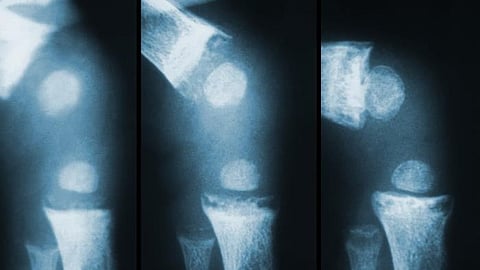

Osteoarthritis is a chronic disease that affects cartilage and surrounding tissues. Patients present with pain, reporting, joint stiffness, and knee deformity. To correct the deformity, surgical correction of the limb is used - corrective osteotomy. As a result of the correction, the maximum load is transferred to the healthy part of the joint. This type of surgical treatment makes it possible to postpone endoprosthesis replacement for years, and sometimes avoid it. With time, the postoperative result worsens. There are hypotheses that the effectiveness of osteotomy may be related to the ability of the patient's tissues to regenerate. RUDN doctors tried to prolong the positive effect with the help of stem cells and blood plasma.
“Osteoarthritis of the knee is the most common disease of the musculoskeletal system. Treatment includes conservative approaches aimed at alleviating clinical symptoms and, as a final option, arthroplasty. Surgical correction of the limb allows to achieve long-term regression of osteoarthritis and delay knee arthroplasty. Reducing pain and slowing down the further development of osteoarthritis allows you to save your joint, which is always better than artificial. However, the results of treatment, unfortunately, gradually worsen over time,” Aleksey Prizov, PhD, Associate Professor of the Department of Traumatology and Orthopedics, RUDN University.
Doctors conducted an experiment involving a series of patients suffering from osteoarthritis of the knee joint with damage to one of the sections of the joint. All patients underwent surgical correction of the limb. Six weeks after the operation, half of the patients were injected with platelet-rich plasma (PRP) into the knee joint, the other half received stromal vascular fraction (SVF), their own stem cells from adipose tissue with regenerative potential. Doctors continued to monitor patients for a year and a half. RUDN doctors monitored the level of pain and functional activity.
Those patients who received platelet-rich plasma showed a slightly better result, visible only on the KOOS, KSS and VAS scores. The first two evaluate the function of the knee joint and the activity of the patient, the last measures the intensity of pain. In patients who were injected with stem cells, they also received good results on clinical and functional scores and the best indicators in terms of the degree of regeneration of destroyed joint tissues (articular cartilage). The physicians concluded that both options can be considered as improving the results of the technique for stimulating tissue regeneration after osteotomy.
“Further studies with more patients are needed to confirm our findings. It is also necessary to conduct a more detailed study of the cellular and molecular mechanisms of articular regeneration. This will ensure the emergence of new approaches to improve the effectiveness of the treatment of osteoarthritis,” Aleksey Prizov, PhD, Associate Professor of the Department of Traumatology and Orthopedics, RUDN University. (KSN/Newswise)
